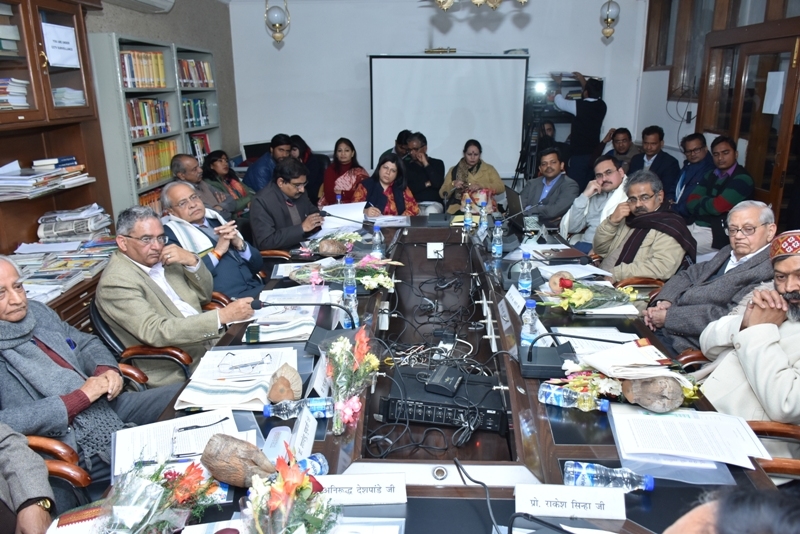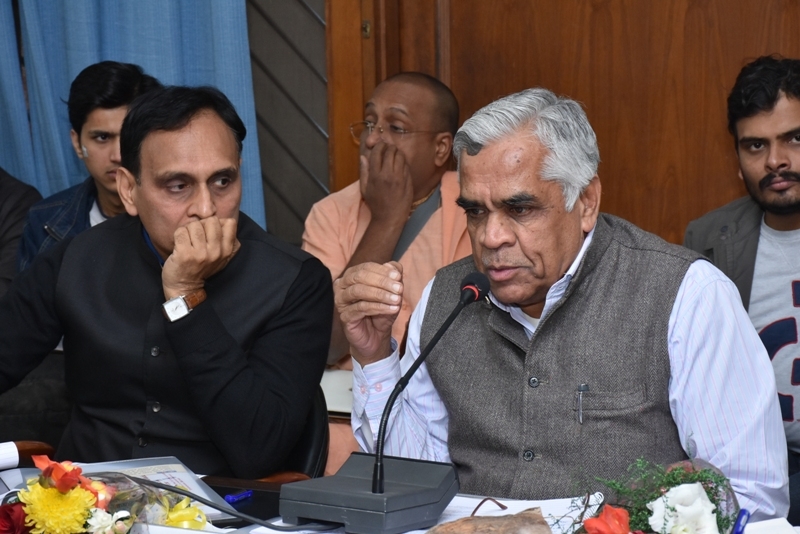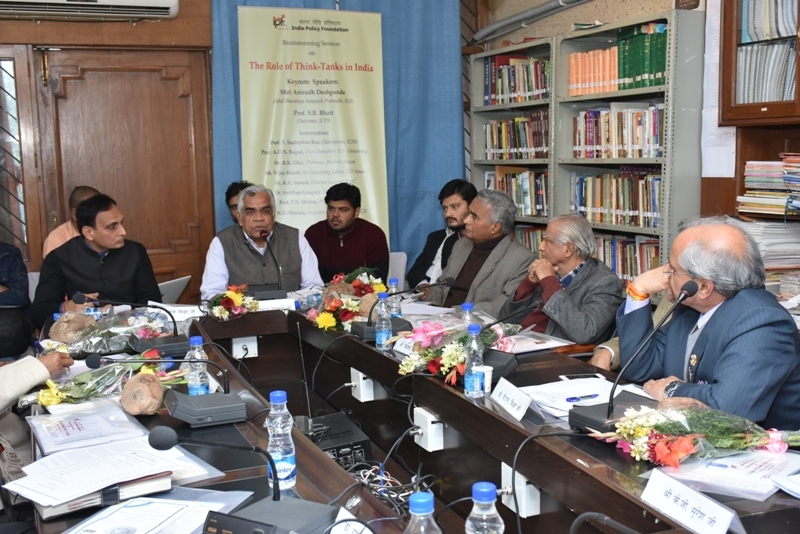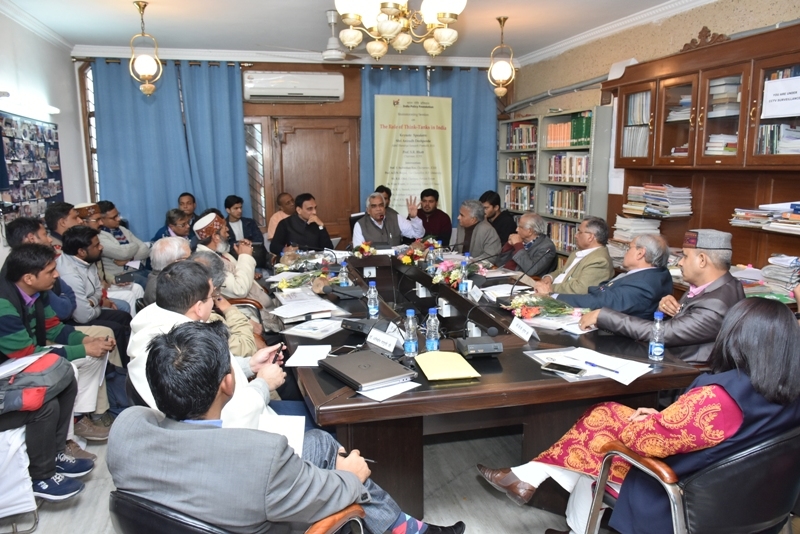The Role of Think-Tanks in India
Total Views |
January 13, 2017, IPF Seminar Hall, New Delhi
Keynote Address: Shri Anirudh Deshpande, Akhil Bharatiya Sampark Pramukh, RSS, Prof. S.R. Bhatt, Chairman ICPR, Prof. ADN Bajpai, Vice Chancellor, H.P. University, Shri R.K. Ohri, Chairman Patriots Forum, Shri Vijay Kranti, Senior Consulting Editor, DD News, Shri K.G. Suresh, Director General, IIMC, Dr. Anirban Ganguly, Director, SPMRF, Prof. P.N. Mishra, Professor, DAVV, Prof. N.N. Sharma, BIMTECH
Chair: Dr. Saradindu Mukherji, PPT Presentation: Dr. Rahul Singh, BIMTECH

India Policy Foundation has organised a brain storming session on January 13 on The Role of Think Tanks in India in which eminent speakers from all walks of life participated and put across their view on the subject. Most of the speakers were of the opinion that there is a difference between the expectation and the actual work of the Think Tanks in India. There is a need to take criticism in positive manner.

Speaking on the occasion Akhil Bharatiya Sampark Pramukh of the RSS Shri Anirudh Deshpande said, “We are discussing about think tanks here but the kind of think thank we are talking about is difficult to find anywhere. What should be done and what should not be done, there is no such think tank to tell. Think tanks working comprehensively for the welfare of the society are elusive to find.”

Sh. Deshpande further said that the process of thinking was not done by being detached from the society. There are three aspects of it 1) Philosophy 2) Ideals or Values 3) Behaviours. It is the responsibility of think tanks that gives philosophy. In reality there is dearth of intellectuals in the country.

Prof. Rakesh Sinha, Honorary Director, India Policy Foundation, Quoted Manneeya Sarsanghachal Shri Mohan Rao Bhagwat by saying that Intellectuals need to be a saint. He said, “The problem starts when intellectuals start co-opting with government policies or start speaking the language of the government in lieu of reward. On the other hand criticisms should not be looked upon as adversaries. When intellectualism started hobnobbing with politics, it has to get into sycophancy. However, it can play a bigger role.
Chairman of the Indian Council of Historical Research Prof. Y Sudershan Rao said that the concept of think tank is not Indian. “We have a long and rich tradition of intellectualism. The role of think tank in social reform has been immense and all the social revolution has the role of think tank that started from the coffee clubs. They are influencing millions and at present we are doing it on institutional basis,” he said.
Sh. K G Suresh said that there was a need to groom intellectual for think tank but that is not happening. It is not only think tank that influences the government but people, narratives and discourse are also influenced by it. “There is a matter of concern that in today’s world the neutral space has shrunk miserably. It is equally important to study other’s point of view only then we would be able to counter it,” he said.
Indian Council of Philosophical Research, chairman, Prof S R Bhatt was of the opinion that the present day intellectuals were surrendered before the government. Actually the task of think tank is to influence things globally. It should be for the welfare of everyone but that starts from within.
Prof A D N Bajpai said that the ideal situation was that thinker should talk about everyone except himself. The selflessness is the prerequisite for any intellectual and only then welfare of the society was possible.
Sh. R K Ohri said that all the ideal situation is all right but the country is in the midst of a war with destructive forces that needs to be understood and countered. Think tanks are told to battle ideas. They should be used to challenge conventional wisdom. There is a need to transform view of think tank into actual activities whether the government does it or the people do it.
Sh. Vijay Kranti said that intellectuals are collective wisdom of the society. As far as bias is concerned, there is nothing wrong in it. Sometime biases are necessary and they should be given the chance to grow. There is another thing that needs to be understood that think tank should be sustainable but they should not become parking lot.
Speaking on the occasion Prof. P N Mishra said that intellectuals speaking the language of the government could be stopped by the government itself. If any society is unable to digest criticism, one should believe that the time of its destruction has come. Any fresh idea and solution to any problem could come from any quarters even from unexpected ones. Stopping any idea to mature will harm the society.
Dr. Anirban Ganguly said that it was wrong to say that things were not being done. We are organising seminars, talks, publishing book. I can say this with conviction as I am part of it. He suggested that there was a need to closely monitor think tanks and NGO funded from outside and branches of International NGOs being opened in India.
Prof. Saradindu Mukherji gave vote of thanks. In his speech, he had said that think tank have bigger role to play as there are lots of thing that are not reaching to its people. Besides that Indian state is promoting such research which is against the ethos of the country.